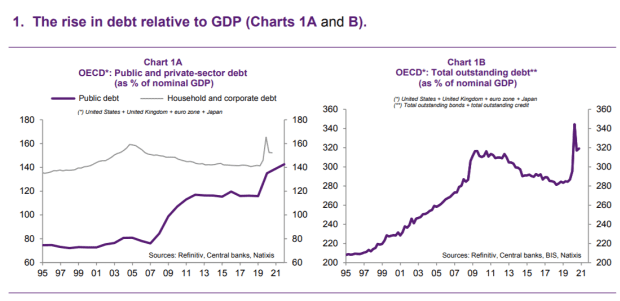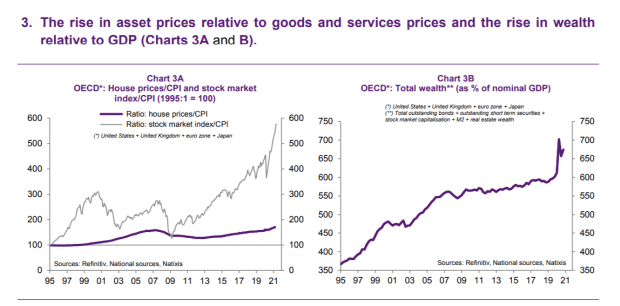Markets seem to be in cruise-control mode, at least until the Jackson Hole gathering of central bankers at which the Federal Reserve may finally announce it will slow the rate of bond purchases. The S&P 500
SPX,
Patrick Artus, a senior economics adviser at French bank Natixis and a professor at the Paris School of Economics, isn’t sharing in the joy. In a very blunt memo to clients, Artus says a crisis is “inevitable.”

The total outstanding debt of the U.S., the U.K., the eurozone and Japan relative to gross domestic product has come off the highest levels of the pandemic as economies have reopened but still is at elevated levels. “Borrower solvency cannot be ensured if debt-to-income ratios increase continuously,” he says.
The money supply also is at records. “The money supply cannot be increased continuously relative to income, as soon or later demand for money, which is linked to savings and income, can no longer increase,” said Artus, whose résumé includes stints at the Organization for Economic Cooperation and Development and the Banque de France.

Also zooming higher is wealth, with both stock and housing prices surging. “Rising relative asset prices cannot be extrapolated: If they become too high, the savings of asset buyers will no longer suffice to buy then, leading inevitably to a downward correction in prices,” he says. Finally, he notes a skewing of income distribution against wage earners: “If wage earnings do not receive productivity gains over a long period, demand for goods and services will become too weak to absorb production, which grows rapidly when earnings are invested.”
So how will this unwind? Artus says a correction in income distribution will lead to faster wage growth and higher inflation. That, in turn, will need to more restrictive monetary policy and higher inflation-adjusted interest rates. The more restrictive monetary policy will then stabilize asset prices and wealth, forcing deleveraging. And that deleveraging will lead to a recession due to the necessary fall in demand among households, companies and governments.
“The stabilization of these variables will lead to a very drastic crisis, due to faster growth in wages and inflation, a restrictive monetary policy, a fall in wealth and asset prices, and a recession caused by a fall in domestic demand,” he concludes.
Fed minutes on tap
Speaking of the Fed, the minutes from the U.S. central bank’s latest meeting are set for release at 2 p.m. Eastern time. “Markets will be looking for more color on discussions surrounding inflation risks. While the central view remains that rising inflation is likely to be transitory, Fed Chairman Jerome Powell did acknowledge that recent developments need to be monitored. So any detail on the extent to which concerns have risen of late will be interesting,” said Rhys Herbert, a senior economist at Lloyds Bank.
The European Union upgraded its economic forecasts for the next two years, now seeing eurozone growth of 4.8% this year vs. an expectation in May of 4.3% growth. The EU said that’s the largest upward revision it’s made in more than 10 years.
China will strengthen rules for companies seeking to sell abroad, just days after tightening scrutiny of Didi Global
DIDI,
Oil giant Royal Dutch Shell
RDS.B,
The president of Haiti, Jovenel Moïse, was assassinated, the head of the country’s government said.
The markets
The major action was in the bond market, where the yield on the 10-year Treasury
TMUBMUSD10Y,
U.S. stock-market futures
ES00,
Crude-oil futures
CL.1,
Random reads
Sotheby’s said it will accept bitcoin
BTCUSD,
Chinese scientists want to deflect asteroids with rockets.
Need to Know starts early and is updated until the opening bell, but sign up here to get it delivered each morning once to your email box. The emailed version will be sent out at about 7:30 a.m. Eastern time.
Want more for the day ahead? Sign up for The Barron’s Daily, a morning briefing for investors, including exclusive commentary from Barron’s and MarketWatch writers.







